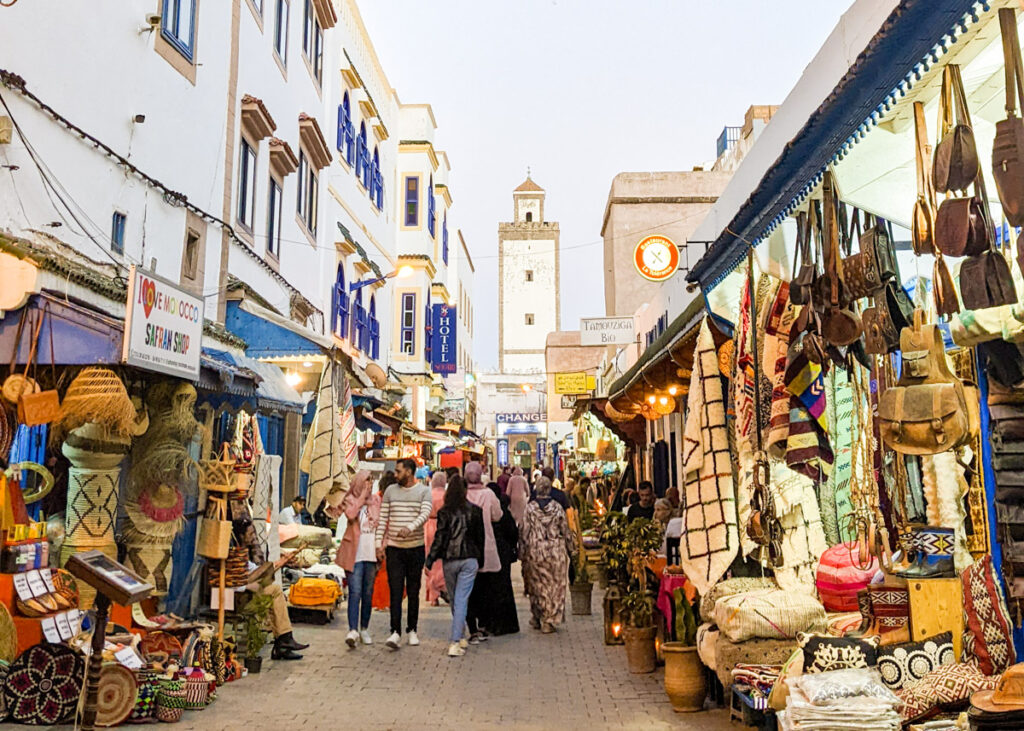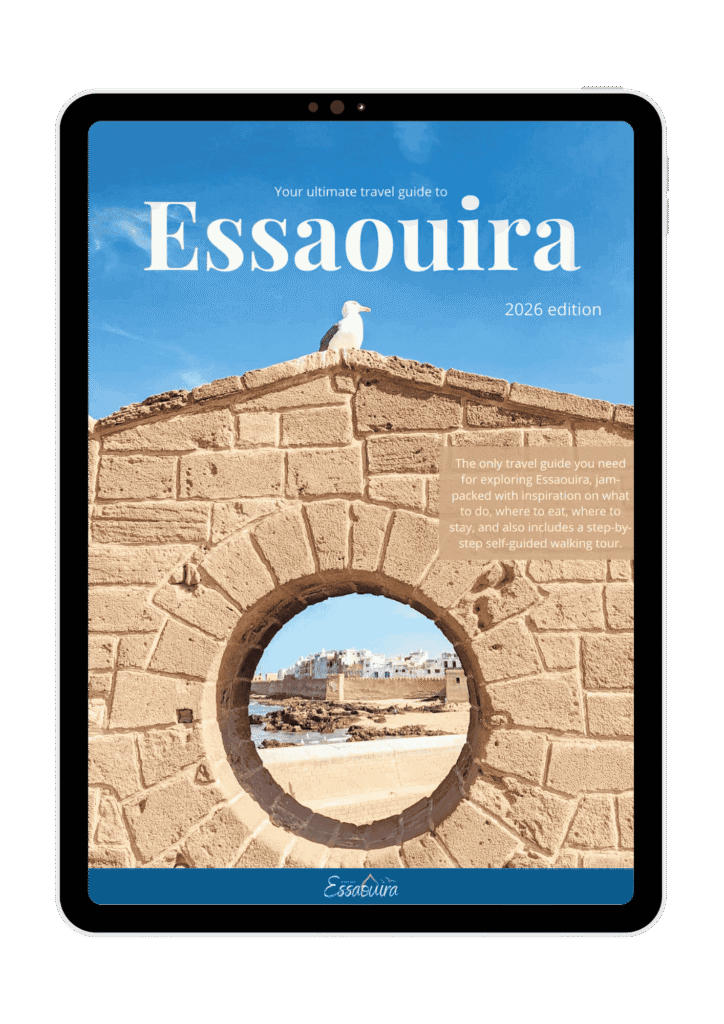Ramadan runs from Tuesday, 17th February, to Thursday, 19th March. If your visit to Essaouira falls within these dates, be sure to read our guide to visiting during Ramadan.
Haggling in Morocco can be a fun experience, especially if you manage to snag a bargain, but you need to have the right approach. Read on for our tips.
Wander through any Moroccan medina and it won’t be long before you spot the souvenir and clothing stalls. Run by experienced and wily shopkeepers, the prices are rarely fixed and are open to some serious negotiation. The range (and quality) of the goods on offer is truly epic and it takes some strong willpower to refrain from buying at least one souvenir from your trip to this beautiful country.
But you need to bring your A-game as Moroccan stallholders are the Olympic champions of haggling, and they don’t give any discounts for novice players. After years of visiting Morocco and buying our fair share of souvenirs, we probably sit somewhere in the middle of the rankings, but hopefully our tips will help you to at least give the locals a decent game.
1. Do your research
As you spend more and more time in Morocco, you’ll get an idea of prices for things as you walk around the souks and tourist areas. Sometimes shops display fixed prices that will at least give you some idea of the going rate.
If you find a friendly stallholder, you can also chat to them to gauge the price range, just make it clear that you’re only asking today, not actually buying. Eventually, you’ll build up a knowledgebase of prices for everything from t-shirts to eagle statues.
One tip: if you do know the price of something, and tell a shopkeeper that the stall down the road is selling it for 40 dirhams cheaper, the guaranteed response will be along the lines of ‘Yes, but that’s not the same quality or material as mine’. Ignore this, it’s the final stop before you reach a reasonable price.

2. Maintain that poker face
Moroccan shopkeepers are experts at judging body-language and excitement levels so, if you see a scarf you adore, perhaps keep it yourself rather than letting everyone around you know that you simply have to have it.
An air of non-desperation is key to setting the price bar at a reasonable level, even if you know in your heart-of-hearts that you’re buying it, whatever the price.
3. Ignore the first price
The first price is never realistic and is light-years away from the real price, often three or more times the true value. Unfortunately, some tourists do pay these rates without realising, so it’s always worth it for the shopkeepers to test the water.
You should express shock and mild indignation at this stage, letting them know you’re not that gullible. You’ll be asked to offer your ‘best price’, which should be about one-third of what you were just offered.
The game has begun.
4. Always keep it friendly and smile
A fair amount of amateur dramatics are needed during the negotiation, ranging from mild annoyance, indignation, shock and confusion. It’s all part of the charade. But do keep it friendly and keep a smile on your face. Anger and aggression are hugely unwelcome and inappropriate in Moroccan culture and are brought out for only the most extreme scenarios, not haggling over 20 dirham for a dinner plate.
If you feel yourself getting annoyed (or the shopkeeper is), step away and say ‘shokran’.
5. Buy in bulk
Buying in bulk nearly always brings the price down but it can sometimes be a useful card to play towards the end of the proceedings. After you’ve got them down to a reasonable price for one item, you can do some quick maths and ask if they’ll do five for cheaper.
E.g. you’re buying a silk scarf and have whittled them down to 60 dirhams; it’s highly likely you’ll get two for 100 dirhams, or three for 150.
Serious bulk buying (e.g. you want to restock your entire kitchen with Moroccan pottery) is best explained up-front so they know what they’re dealing with.

6. Be prepared to walk away
Whether it’s a plate, pair of shoes or six-foot high silver ceremonial jug, an item is only worth what you’ll pay, and the shopkeeper will accept. If you’re not getting anywhere near your preferred number, it’s totally fine to keep it pleasant, say ‘shokran’ and calmly walk away.
Although this is the nuclear option when it comes to haggling so you might be mistaken for a genuine player and find the shopkeeper chases after you offering to accept your last price. Which leads us onto…
7. Don’t make false promises
Never make an offer that you don’t intend to honour. It’s kind of like an unwritten contract and it’s bad form to offer (e.g.) 50 dirhams but then still walk away when the shopkeeper eventually agrees.
Another favourite trick of shopkeepers is to say ‘Maybe later?’ as you walk past. Avoid saying ‘Yes, perhaps’ because they’ll remember you the next time you pass their shop. Even though they know you were just being polite, the interaction is exaggerated to have been a promise to browse and buy, and it can lead to problems.
‘La shukran’ (no, thank you), is the best response.
8. Keep a cool head with numbers
Unless you’re American, don’t let them confuse you with prices quoted in US dollars, although it is common for prices to be displayed in Euros as well. We usually think it’s a red-flag if shops quote prices in US dollars.
It’s easiest to deal in Moroccan dirhams so make sure you know the exchange rate before you enter, and have your absolute top figure memorised in dirhams.
Cash is much easier than credit cards as the latter often aren’t accepted or will attach fees and hassle.
9. Take your time
Souvenir shopping is supposed to be fun so take your time and enjoy the experience. Despite the protestations of the vendor, in busy places like Marrakech, you’re just the hundredth person they’ve spoken to today, and it’s not the end of the world if you leave the shop empty-handed.
If you need some time to think about it and make a decision, explain you need a coffee and might come back later (as above, don’t say this if you have no intention of doing so). As we mentioned earlier, this approach will nearly always lead to a lower price offer anyway.

10. Check your change
It’s rare but not uncommon for shopkeepers to give you the wrong change, either accidentally or on purpose. Check your change before you leave the shop and don’t feel rushed.
Compared to plenty of other countries, Morocco isn’t too bad for shopkeepers having change, but it’s not uncommon for them to take your large note away to their friend to get change. As long as you’re at their physical shop, this is normal and you don’t need to panic; they will be back.
If you can, having the correct change makes the whole transaction easier.
11. Be fair and respect the process
By all means be competitive but make sure you respect both the game and the players. The objective is to get something at a fair price, not to grind someone down into the ground for the sake of 10 dirhams. Often these are family businesses that rely on tourist income to survive and it’s rare (certainly outside Marrakech) to find someone who is actively trying to rip you off.
If you can afford to travel to Morocco, it’s likely you can afford the extra ten or twenty dirhams they’re asking, even if it is slightly above their rock-bottom price. Haggling is one thing, taking advantage of economic disparities is, arguably, quite another.
12. Not all haggling situations are the same
Be aware of your surroundings when you’re haggling. A small family-run stall in a quiet village, where the items are handmade by the owner, are more likely to quote you a reasonable price than you’d find in the heart of Marrakech’s medina. The tips we’ve listed above should be applied in context, not as gospel.
13. Save your shopping for Essaouira
Shopping and haggling Marrakech can be exhausting. However, if you’re heading to the port-city of Essaouira on the Atlantic coast, save your shopping for there. Shopping in Essaouira is far more relaxed and sellers are nowhere near as pushy. This isn’t to say that you don’t need your researched Morocco haggling skills, but it will feel much less intense.


Final thoughts on haggling in Morocco
Approached in the correct spirit, haggling in Morocco can be a fun experience, especially if you manage to snag a bargain. Do remember that you’re usually dealing with people on lower incomes than you, and the extra 10 dirhams you save might mean more to them than it does to you. But that doesn’t mean you should blindly pay whatever you’re asked. In most situations, Moroccans will respect and recognise a fellow haggler and, assuming you part as friends, everyone can be a winner.
Explore Essaouira ebook
Updated for 2026, the Explore Essaouira ebook is the only travel guide you need for exploring Essaouira. This is jam-packed with inspiration on what to do, where to eat, where to stay, and also includes a step-by-step self-guided walking tour (with photos).
This is a PDF download for use offline and on the go (and ad-free!). Save it to read on the plane to Morocco, download to your phone to follow the self-guided walking tour around the medina, or print it off at home before you leave on your adventures and highlight all the bits you want to remember for your visit.

If you have found this website useful for planning your Essaouira adventures, you can show your support by buying Jenny a coffee. Thanks so much!
Before you go, these guides may be useful:
The best things to do in Essaouira
Essaouira walking tour (self-guided)
Day trips from Essaouira
How to get around Essaouira
The best restaurants in Essaouira
The best hotels in Essaouira
Essaouira travel FAQs: everything you need to know before your visit
A brief history of Essaouira


